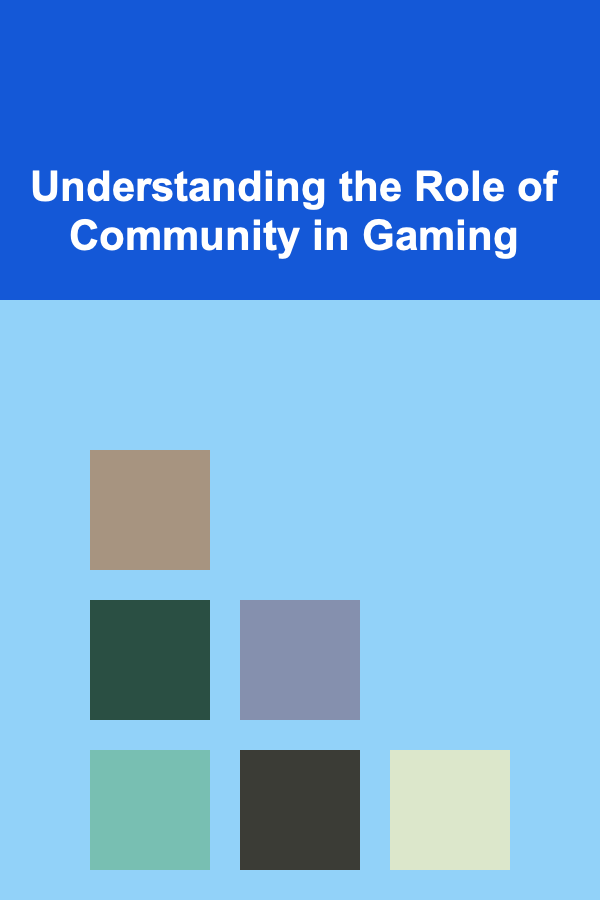
Understanding the Role of Community in Gaming
ebook include PDF & Audio bundle (Micro Guide)
$12.99$6.99
Limited Time Offer! Order within the next:

The gaming landscape has evolved dramatically since the days of solitary arcade experiences and isolated console sessions. Today, community is inextricably linked to the very fabric of gaming. It's no longer just about playing a game; it's about sharing experiences, collaborating, competing, and connecting with others who share a passion. Understanding the multifaceted role of community in gaming is crucial for appreciating its cultural significance, its economic impact, and its profound influence on game design and player behavior. This essay will delve into the various ways community manifests itself within gaming, exploring its benefits, its potential pitfalls, and its lasting impact on the industry and its players.
The Evolution of Gaming Communities
The notion of gaming communities wasn't born with the internet, but its explosive growth is undeniably tied to it. Early forms of community existed in local arcades, where players gathered to share tips, compete for high scores, and establish rivalries. Home consoles brought gaming to a wider audience, but interaction was largely limited to friends and family playing together in the same room. Online gaming, however, revolutionized the social aspect of the hobby.
Early online games, such as MUDs (Multi-User Dungeons) and text-based adventures, fostered communities through shared narratives and collaborative problem-solving. These communities relied heavily on text-based communication, requiring players to actively participate in shaping the game world and interacting with other players. As technology advanced, graphical online games emerged, offering more immersive experiences and visually richer environments. Games like Ultima Online and EverQuest became pioneers in the MMORPG (Massively Multiplayer Online Role-Playing Game) genre, creating persistent virtual worlds where thousands of players could interact simultaneously. These games established the foundation for the modern gaming communities we see today.
The rise of the internet also led to the development of online forums and fan sites dedicated to specific games. These platforms provided spaces for players to discuss strategies, share fan-made content, and organize in-game events. As social media platforms like Facebook, Twitter, and Reddit gained popularity, they further facilitated the formation and growth of gaming communities. Today, Discord has emerged as a dominant platform for gaming communication, offering voice and text chat channels, screen sharing capabilities, and community management tools that cater specifically to gamers.
Different Types of Gaming Communities
Gaming communities are not monolithic entities. They exist in diverse forms, each with its own unique characteristics and purposes. Understanding these different types is essential for navigating the gaming landscape and appreciating the breadth of community involvement.
Genre-Specific Communities
These communities revolve around particular game genres, such as MMORPGs, MOBAs (Multiplayer Online Battle Arenas), FPS (First-Person Shooters), and strategy games. Players within these communities share a common interest in the mechanics, themes, and competitive aspects of the genre. They often engage in discussions about game updates, strategies, and character builds. Examples include communities dedicated to World of Warcraft , League of Legends , Counter-Strike: Global Offensive , and StarCraft II.
Game-Specific Communities
These communities focus on individual games, fostering a deeper connection among players who share a passion for that specific title. They often feature detailed discussions about lore, character development, and gameplay mechanics. Game-specific communities can be incredibly dedicated and passionate, contributing to the game's longevity through fan-made content, mods, and community-organized events. Examples include communities dedicated to Minecraft , Fortnite , Grand Theft Auto V , and The Elder Scrolls V: Skyrim.
Platform-Specific Communities
These communities are centered around specific gaming platforms, such as PC, PlayStation, Xbox, and Nintendo. Players within these communities often share experiences related to the platform's hardware, software, and online services. They may discuss game compatibility, platform exclusives, and the overall gaming experience on that particular platform. These communities often foster a sense of loyalty and camaraderie among players who share a preference for a specific platform.
Content Creator Communities
The rise of streaming and online video content has led to the emergence of communities centered around content creators, such as streamers, YouTubers, and esports players. These communities are often highly engaged and interactive, with fans actively participating in live streams, commenting on videos, and engaging with the content creator on social media. Content creators often serve as central figures within these communities, providing entertainment, guidance, and a sense of belonging for their viewers. Prominent examples include communities surrounding streamers like Ninja, Shroud, and Pokimane, and YouTubers like PewDiePie and Markiplier.
Competitive Gaming Communities
Competitive gaming communities are dedicated to esports and organized competitive play. These communities often involve professional players, teams, coaches, and fans who are passionate about the competitive aspects of gaming. They engage in discussions about strategies, player performance, and tournament results. Competitive gaming communities are highly structured, with established leagues, tournaments, and rankings systems. Games like Dota 2 , Overwatch , and Valorant have thriving competitive gaming communities with dedicated fans and professional players.
The Benefits of Gaming Communities
Gaming communities offer a wide range of benefits for both players and the gaming industry as a whole. These benefits contribute to the overall positive experience of gaming and its cultural impact.
Social Connection and Belonging
Gaming communities provide a space for players to connect with others who share their interests and passions. This sense of belonging can be particularly important for individuals who may feel isolated or marginalized in other areas of their lives. Gaming communities offer a supportive environment where players can share their experiences, build friendships, and find common ground. This social connection can be especially valuable for younger players who are still developing their social skills and identities.
Knowledge Sharing and Skill Development
Gaming communities are valuable resources for knowledge sharing and skill development. Players can learn from each other through discussions, tutorials, and shared experiences. More experienced players often mentor newer players, helping them improve their skills and understand the game mechanics. This collaborative learning environment fosters a sense of community and encourages players to strive for improvement. Forums, wikis, and online guides created by community members often provide comprehensive information about games, making them accessible to players of all skill levels.
Enhanced Gameplay Experience
Gaming communities can significantly enhance the gameplay experience by providing opportunities for cooperative play, competitive challenges, and shared storytelling. Playing with others can make games more engaging and rewarding, as players work together to achieve common goals. Communities also facilitate the organization of in-game events, such as raids, tournaments, and social gatherings, which further enhance the gameplay experience and foster a sense of camaraderie. Moreover, role-playing communities expand the game's narrative through collaborative storytelling, adding new depth and excitement to the experience.
Feedback and Game Development
Gaming communities play a crucial role in providing feedback to game developers, helping them improve their games and address player concerns. Developers often actively engage with their communities, soliciting feedback on game updates, new features, and balance changes. This feedback loop allows developers to fine-tune their games based on player preferences, ensuring that the game remains engaging and enjoyable. Many games also have dedicated community managers who act as liaisons between the developers and the players, relaying feedback and addressing community concerns. In some cases, community members are even directly involved in game development through modding and creating custom content.
Longevity and Support of Games
Gaming communities can significantly contribute to the longevity and support of games by keeping them alive and engaging long after their initial release. Dedicated communities often create fan-made content, mods, and events that extend the game's lifespan. They also provide ongoing support to other players, helping them troubleshoot problems and learn the game mechanics. This community support can be invaluable, especially for older games that may no longer receive official support from the developers. The continued activity of a strong community can attract new players to the game and ensure its continued relevance.
The Potential Pitfalls of Gaming Communities
While gaming communities offer numerous benefits, they are not without their potential pitfalls. Understanding these potential downsides is crucial for creating and maintaining healthy and inclusive communities.
Toxicity and Harassment
One of the most significant challenges facing gaming communities is the prevalence of toxicity and harassment. Online anonymity can embolden individuals to engage in harmful behaviors, such as flaming, trolling, and personal attacks. This toxicity can create a negative and unwelcoming environment for many players, particularly women, minorities, and LGBTQ+ individuals. Addressing toxicity requires a multi-faceted approach, including strong moderation policies, community education, and the development of tools that allow players to report and block abusive behavior.
Exclusion and Gatekeeping
Gaming communities can sometimes be exclusionary, creating barriers for new players or those who do not conform to certain norms or expectations. Gatekeeping, the practice of controlling access to a community or activity, can discourage newcomers and limit diversity. This can manifest in various ways, such as criticizing new players for their lack of skill, dismissing their opinions, or excluding them from in-game activities. Creating inclusive communities requires actively welcoming new players, celebrating diversity, and promoting a culture of respect and acceptance.
Echo Chambers and Groupthink
Gaming communities can sometimes become echo chambers, where individuals are primarily exposed to opinions and perspectives that align with their own. This can lead to groupthink, where dissenting opinions are suppressed and critical thinking is discouraged. Echo chambers can reinforce existing biases and limit the exchange of new ideas. Encouraging open dialogue, promoting diverse perspectives, and fostering a culture of critical thinking are essential for preventing the formation of echo chambers.
Addiction and Excessive Engagement
The immersive nature of gaming communities can lead to addiction and excessive engagement. Spending excessive amounts of time gaming can negatively impact other areas of life, such as work, school, and personal relationships. It can also lead to health problems, such as eye strain, carpal tunnel syndrome, and sleep deprivation. Maintaining a healthy balance between gaming and other activities is crucial for preventing addiction and promoting overall well-being. Setting time limits, taking breaks, and prioritizing other responsibilities are important strategies for managing gaming habits.
Misinformation and Scams
Gaming communities can sometimes be breeding grounds for misinformation and scams. False information can spread rapidly through online forums and social media, leading to confusion and distrust. Scammers often target gamers with fraudulent offers, phishing schemes, and fake giveaways. Being skeptical of online information, verifying sources, and protecting personal information are essential for avoiding misinformation and scams. Reporting suspicious activity to community moderators and platform administrators can help prevent others from falling victim to these schemes.
The Impact on Game Design and Development
The existence of vibrant and engaged gaming communities has a profound impact on game design and development. Developers increasingly recognize the importance of community feedback and actively incorporate it into their development processes.
Community-Driven Development
Many modern games are developed with the active involvement of the community. Developers often release early access versions of their games, allowing players to provide feedback and suggestions throughout the development process. This community-driven approach can lead to more polished and engaging games that better meet the needs and expectations of players. Games like Minecraft and Kerbal Space Program have benefited greatly from community-driven development, with player feedback shaping the game's features and direction.
Modding and User-Generated Content
Many games support modding and user-generated content, allowing players to create their own modifications, maps, and stories. Modding can extend the lifespan of a game and add new layers of depth and complexity. It also empowers players to express their creativity and contribute to the game's ecosystem. Games like The Elder Scrolls V: Skyrim and Grand Theft Auto V have thriving modding communities that have created thousands of unique and engaging modifications.
Balancing and Tuning
Gaming communities play a critical role in balancing and tuning games. Players often identify imbalances and exploits in game mechanics, providing valuable feedback to developers. This feedback allows developers to fine-tune the game's balance, ensuring that all characters, weapons, and strategies are viable. Community testing and feedback are particularly important for competitive games, where even minor imbalances can have a significant impact on gameplay.
Community Management and Support
Effective community management is essential for fostering a positive and engaged community. Community managers act as liaisons between the developers and the players, relaying feedback, addressing concerns, and organizing community events. They also play a crucial role in moderating the community and enforcing the rules. Strong community management can help build trust between developers and players, leading to a more collaborative and supportive relationship.
The Future of Gaming Communities
The role of community in gaming is likely to become even more significant in the future. As technology continues to evolve and gaming becomes more integrated into our lives, gaming communities will play an increasingly important role in shaping the gaming experience.
Increased Integration of Social Features
Future games will likely feature even more integrated social features, making it easier for players to connect with each other, share their experiences, and participate in community activities. This could include features like in-game voice chat, social media integration, and community hubs. The goal is to create seamless and intuitive social experiences that enhance the gameplay and foster a sense of belonging.
The Rise of Decentralized Communities
Blockchain technology and decentralized platforms are beginning to disrupt the traditional gaming industry, offering new opportunities for community ownership and governance. Decentralized gaming communities allow players to own and control their own in-game assets, participate in decision-making processes, and earn rewards for their contributions. This shift towards decentralization could empower players and create more equitable and sustainable gaming ecosystems.
AI-Powered Community Management
Artificial intelligence (AI) is being used to improve community management and moderation. AI-powered tools can automatically detect and remove toxic content, identify potential scammers, and provide personalized support to players. These tools can help community managers scale their efforts and create safer and more welcoming communities.
The Metaverse and Gaming Communities
The metaverse, a shared virtual world that integrates gaming, social media, and other digital experiences, is poised to transform the role of gaming communities. In the metaverse, gaming communities can extend beyond individual games and become broader social networks, where players can interact, collaborate, and create together. The metaverse could unlock new opportunities for community building and engagement, blurring the lines between the physical and virtual worlds.
Conclusion
Community is an indispensable element of modern gaming. From fostering social connections and facilitating knowledge sharing to influencing game design and driving innovation, the impact of community is undeniable. While potential pitfalls like toxicity and exclusion must be addressed, the benefits of well-managed and inclusive gaming communities far outweigh the risks. As gaming continues to evolve, the role of community will only become more crucial, shaping the future of the industry and the experiences of players around the world. Understanding and nurturing gaming communities is not just about enhancing gameplay; it's about building a more connected, collaborative, and enriching world for gamers everywhere.

How to Decorate Your Home Office for Under $100
Read More
How to Organize Your Closet by Using the Right Storage Solutions
Read More
How to Use Stoic Principles to Improve Relationships
Read More
How To Deal with Unrealistic Relationship Expectations
Read More
How to Attract Bluebirds and Other Cavity Nesters
Read More
10 Tips for Minimizing Estate Taxes
Read MoreOther Products

How to Decorate Your Home Office for Under $100
Read More
How to Organize Your Closet by Using the Right Storage Solutions
Read More
How to Use Stoic Principles to Improve Relationships
Read More
How To Deal with Unrealistic Relationship Expectations
Read More
How to Attract Bluebirds and Other Cavity Nesters
Read More